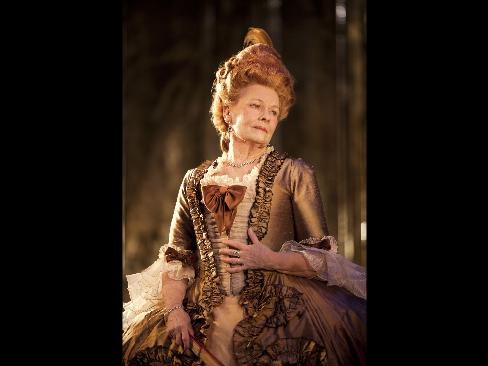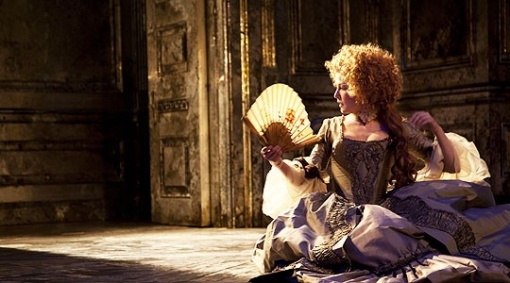Madam de Sade
by Yukio Mishima
 The Donmar in the West End series has been a huge success.
Serious plays with major stars played in the West End at reasonable prices. The
presence on stage of Dame Judy was sufficient to ensure that getting tickets for
Madam de Sade has been more like a treasure hunt. Creatively, however they are
playing Sunday afternoon matinees – a find idea in my book - which is where we
caught up with this phenomena.
The Donmar in the West End series has been a huge success.
Serious plays with major stars played in the West End at reasonable prices. The
presence on stage of Dame Judy was sufficient to ensure that getting tickets for
Madam de Sade has been more like a treasure hunt. Creatively, however they are
playing Sunday afternoon matinees – a find idea in my book - which is where we
caught up with this phenomena.
The whole experience was very strange. The Wyndham’s
Theatre is a
piece of baroque nonsense, with cherubs painted on the ceilings and indeed above
the proscenium arch. The audience was very West End, matriarchal, middle class,
solid with many US accents around. There was even applause when Judy arrived on
stage – something I thought died out with Brian Rix farces. I was surprised not
to notice any walk outs and was slightly taken aback by the thunderous ovation
at the end. I apologise for sounding hopelessly patronising, but the play and
the audience didn’t mix.
Madam de Sade was written in 1965 by Japanese play
write Yukio Mishima as a homage to Racine. Its basis is the effect a non-appearing de
Sade
(Alfonso) has on a range of women representing different viewpoints: his wife,
Renée Madam de Sade (faithfulness), her mother Madame de Montreuil, the epitome of respectability played by Judy Dench,
her sister Anne (innocence), Baronesse de Simiane a devout religious acquaintance,
Comtesse de Saint-Fond a courtesan
(deliciously played by Frances Barber) and the servant Charlotte. In the opening
scene the Comtesse delights in telling the saintly Baronesse the intimate details of Alfonso’s disgrace –
the 4 naked women, the naked servant, the beatings, the blood, the pain and the
anal sex. While the play looks like the costume drama to end all costume dramas
– goodness knows how many miles of cloth were on stage - the sexual detail is
definitely not out of Cranford. Later Madame de Montreuil challenges her daughter on
how she spent Christmas the year Alfonso escaped, explaining that her agent saw
he ‘hanging naked from a chandelier being licked clean of blood and other fluids
b y a 16 year old boy’....
y a 16 year old boy’....
The action – well, dialogue, there is no discernable
action – takes place in three scenes covering 20 years, culminating in the
French Revolution. The moral focus of France has changed, and de Sade’s sexual
peccadilloes make him an acceptable sort of aristocrat. Influenced by Alfonso’s
sexuality, the Comtesse becomes a martyr for the revolution playing the insatiable
prostitute in Marseilles, Renee, after sticking faithfully to her husband’s
cause, abandons him in the moment of his release while the Baronesse (now a nun) sees
spirituality in Alfonso’s hedonistic dedication to pleasure.
The acting is consistent, and Judy Dench certainly has a
presence, but for my money Frances Barber steal the show - but then she does
have all the best
lines.
I haven’t remotely go to grips with the themes in this
play, what parallels there are between 18th century Paris and 60s
Japan, what exactly he was trying to say in this wordy piece (clearly something
about ritual and society, about revolution, about relative morality) but it was
thoroughly entertaining. What it was not was the sort of anodyne play in which
people applaud the entrance of the star. Quite how some of this audience sat
through the graphic sexual descriptions or the torrent of allusions to
blood, red roses, thorns ,barbs and whips I don’t know.
Return
to reviews
Return
to home page
 The Donmar in the West End series has been a huge success.
Serious plays with major stars played in the West End at reasonable prices. The
presence on stage of Dame Judy was sufficient to ensure that getting tickets for
Madam de Sade has been more like a treasure hunt. Creatively, however they are
playing Sunday afternoon matinees – a find idea in my book - which is where we
caught up with this phenomena.
The Donmar in the West End series has been a huge success.
Serious plays with major stars played in the West End at reasonable prices. The
presence on stage of Dame Judy was sufficient to ensure that getting tickets for
Madam de Sade has been more like a treasure hunt. Creatively, however they are
playing Sunday afternoon matinees – a find idea in my book - which is where we
caught up with this phenomena.  y a 16 year old boy’....
y a 16 year old boy’....